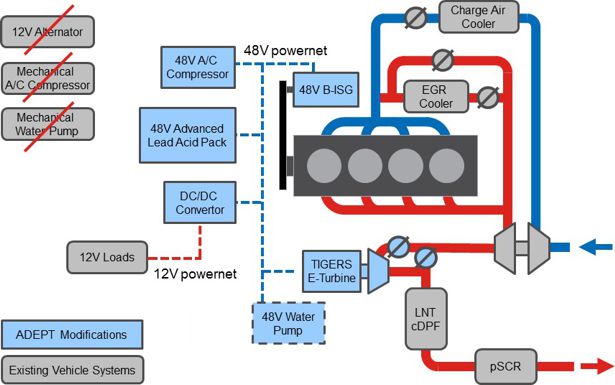Ricardo validates the ADEPT 48V diesel hybrid concept
17 September 2016
Ricardo announced the final testing results of its ADEPT 48V diesel hybrid powertrain concept, confirming a 10-12% reduction in fuel consumption—equivalent to CO2 emissions below 80 g/km. The updated estimated cost of production implementation amounts to €60 per 1 g/km of CO2 reduction, which is competitive with other fuel economy solutions such as full hybrids.
The three-year ADEPT (advanced diesel-electric powertrain) project set the target of developing a range of mild hybrid technologies with 48V ‘intelligent electrification’ utilizing an advanced lead carbon battery. These have been applied to a Ford Focus project demonstrator which was made available for the first time for public ride-and-drive evaluation by delegates at the Low Carbon Vehicle event (LCV2016), held earlier this week at Millbrook, UK.

An important component of the package is the SpeedStart belt-driven integrated starter generator (B-ISG)—supplied by Controlled Power Technologies, a developer of switched-reluctance motor-generator technology—which replaces the conventional alternator and starter motor. The SpeedStart motor can quickly boost engine power and torque when required, without having to feed additional fuel into the engine. The ADEPT powertrain also includes a turbine integrated, electric exhaust gas energy recovery system, known as TIGERS.
The Euro 6b compliant ADEPT package can also offer improved responsiveness and acceleration as a result of the increased full-load powertrain torque available through the hybrid systems. With appropriate fine tuning of design and configuration, the ADEPT concept is also applicable to gasoline or alternatively fueled powertrains, said Ricardo.
The ADEPT project has been led by Ricardo in a research partnership that has included the Advanced Lead Acid Battery Consortium (ALABC), Controlled Power Technologies (CPT), Faurecia Emissions Control Technologies UK Ltd, Ford Motor Company and the University of Nottingham. The research project was jointly funded by the UK Government’s Office for Low Emission Vehicles (OLEV) implemented through the UK innovation agency, Innovate UK, with matching contributions from the participating partners.
Source: Ricardo